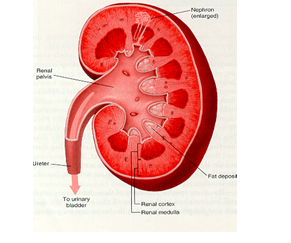Diabetes Mellitus (DM), the commonest form of diabetes can affect kidneys in several ways – it can predispose to urinary tract infection, it can cause the reduced blood supply to the kidney by narrowing of the blood vessels supplying the kidneys and it can cause the death of a part of the kidney called papilla. Most importantly it can interfere with the function of filters within the kidneys (called glomeruli) resulting in progressively increasing protein leak in urine (proteinuria) and irreversible loss of kidney function over a period of several years (diabetic nephropathy). All these effects can lead to Chronic Kidney Disease (CKD). Rest of the discussion will focus predominantly on diabetic nephropathy as it is the commonest kidney involvement in DM.
How are diabetes mellitus and kidney related?
Diabetes Mellitus (DM), the commonest form of diabetes can affect kidneys in several ways – it can predispose to urinary tract infection, it can cause the reduced blood supply to the kidney by narrowing of the blood vessels supplying the kidneys and it can cause the death of a part of the kidney called papilla. Most importantly it can interfere with the function of filters within the kidneys (called glomeruli) resulting in progressively increasing protein leak in urine (proteinuria) and irreversible loss of kidney function over a period of several years (diabetic nephropathy). All these effects can lead to Chronic Kidney Disease (CKD). Rest of the discussion will focus predominantly on diabetic nephropathy as it is the commonest kidney involvement in DM.
How common is kidney failure due to diabetes mellitus?
DM is the commonest cause of CKD all over the world (and in India too). Around one-third of patients on dialysis for CKD have DM; also one third of patients having DM develop CKD.
How long does it take to cause kidney disease?
DM takes a minimum about 5 – 7 years to affect the kidney. The diagnosis of DM may be delayed if it is silent or not associated with the symptoms at the beginning; often we see patients with shorter duration of DM developing CKD related to DM.
What are the symptoms of kidney problem in a diabetic?
The early symptoms of kidney involvement in a diabetic patient are froth in urine and swelling of face, legs and abdomen. With worsening in kidney function, patients may have reduced urine output, increase in blood pressure, loss of appetite, vomiting, tiredness, breathlessness and frequent episodes of low sugar (hypoglycemia). BUT PLEASE BE AWARE that the kidney involvement in a diabetic patient can be silent and all patients with DM should undergo periodic screening for urine and blood testing for proteinuria and serum creatinine. Diabetic eye disease (Diabetic Retinopathy) is invariably associated with diabetic nephropathy and patients who have diabetic retinopathy should undergo urine and blood tests for kidney disease.
How do you detect kidney damage?
Normally there is no protein leak in urine and the routine urine test will report this finding as nil or trace protein; DM over a period of years can cause closure of capillary loops within the filter units resulting first in progressively increasing proteinuria and subsequently progressive reduction in kidney function (kidney function can be calculated with certain mathematical formulae that require estimation of serum creatinine). It is possible to diagnose kidney involvement in DM at the earliest stage by doing urine test for microalbumin – this test will detect the presence of smallest quantities of albumin (a form of protein) even before routine urine test can detect its presence in urine.
What are the treatment options available once severe kidney failure happens?
Dialysis and Renal Transplantation are the available treatment options for patients with advanced CKD. There are two forms of dialysis: Hemodialysis (HD) and Continuous Ambulatory Peritoneal Dialysis (CAPD).
How do you prevent renal damage?
Meticulous control of Blood Sugar and Blood Pressure has been shown to prevent renal damage. Use of drugs called ACE (Angiotensin Converting Enzyme) Inhibitor and Angiotensin 2 receptor blocker will also aid in slowing down the disease process. These drugs should be used only under medical supervision. Cessation of smoking will also help in slowing down the progression of renal disease.
Reference
Robert W. Schrier Diseases of the Kidney and urinary tract 8th Edition

